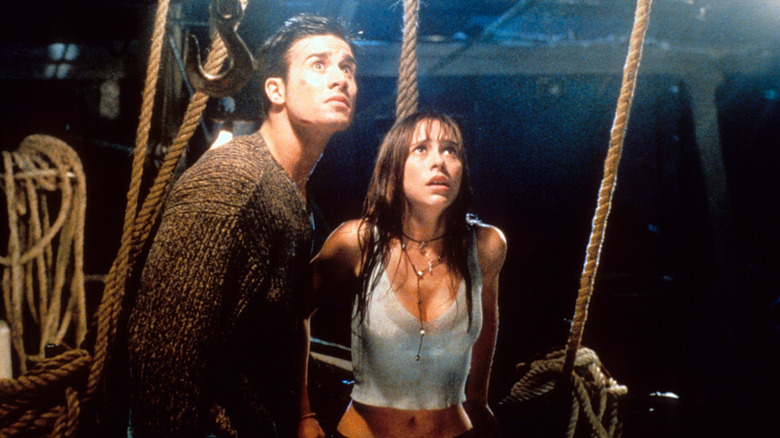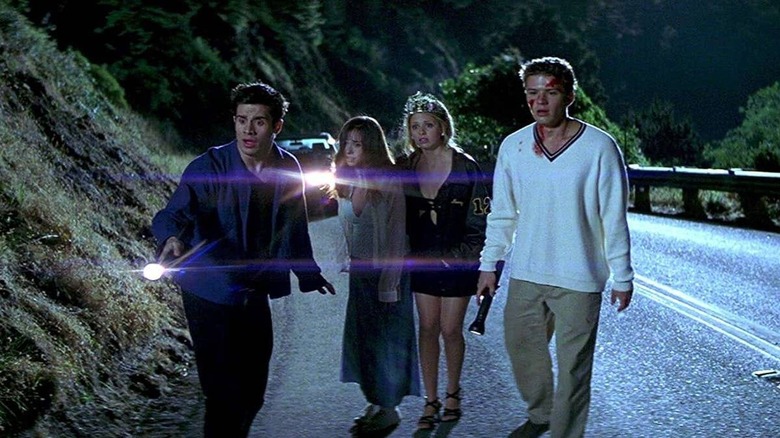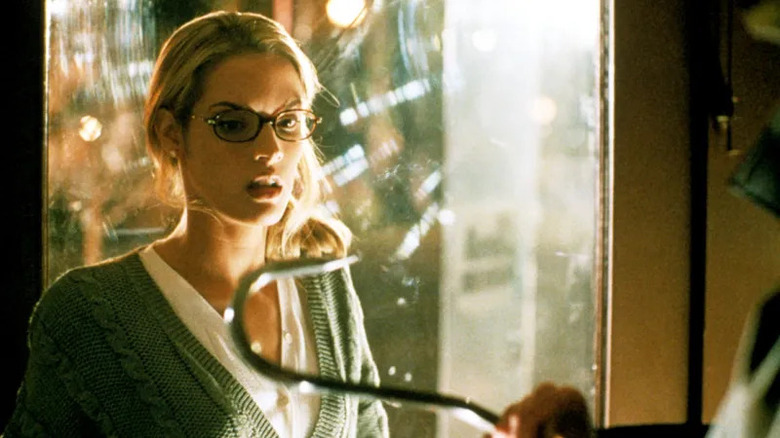I Know What You Did Last Summer Has More Than One Nod To Jaws
For us horror nerds, the concept of "spooky season" is as sacrosanct as it is nebulous. Most people agree the "season" occurs in and around fall and the month of October, but some (including, it seems, the nation's major coffee chains) believe fall begins in August, while others (like myself) will be celebrating all things creepy and kooky all the way through Thanksgiving.
Into this vague, ever-changing definition of seasonal terrors wades the summer movie versus the spooky season movie. Conventional wisdom tends to dictate these terms; generally, movies set on or around Halloween, with colored leaves in abundance, will be considered perfect for the fall, while horror films involving sunny beaches, lakes, and skimpy clothing would be considered summer horror.
That's why "I Know What You Did Last Summer" feels like an anomaly within such general labeling. Released on October 17, 1997, the film became a spooky season hit. Yet everything from its setting, its vibe, and its freakin' title screams the summer season, and this was completely by design. While developing the slasher, director Jim Gillespie made it a point to construct the film in a way that would recall and homage to some major horror classics. On the top of his list lay the ultimate summer horror movie: Steven Spielberg's "Jaws."
'I Know What You Did Last Summer' updates Amity Island for the '90s
Although "Jaws" didn't necessarily set out to become the ultimate summer movie, Spielberg and company made sure to play up the seasonal trappings within the film if only to raise the stakes of suspense. After all, a killer shark isn't too intimidating if he's got no buffet to go to, so setting "Jaws" on the 4th of July weekend with hundreds of swimming tourists best served the story. Yet it undeniably provided audiences with a uniquely unsettling vibe, the idea that a happy, carefree time could be quickly followed by horrific tragedy.
That vibe is what lies at the heart of "I Know What You Did Last Summer," in which a group of teens graduating high school with their whole lives ahead of them accidentally murder a passerby while driving, causing them to make a fateful decision to cover things up and keep it a secret. Being set in North Carolina in the summer, the film was always going to have some attributes of the season. Yet Gillespie goes the extra mile, setting the movie on and around the 4th of July in a small fishing town, depicting celebratory activities that juxtapose with the terror the teens are facing as they're attacked by a mysterious blackmailer. When speaking to Digital Spy in 2017, Gillespie explained how intentional the "Jaws" connections were:
" [...] it's set in a seaside town and I wanted the feel of that. So there's lots of stuff that nods to 'Jaws'; Fourth of July parades, all those things. We amped it up with a Croaker Festival. Gary Wissner designed these big fish buggies, fish hats. We got a load of local school bands to do the march for the festival. We went to town on all that! I wanted the waterfront to have a New England feel, and 'Jaws' was that."
'I Know What You Did Last Summer' takes a more straightforward approach to horror homage
Part of the success of "I Know What You Did Last Summer" lies in it being a de facto follow-up to "Scream"; sure, it's by no means a sequel, but it represented writer Kevin Williamson's next horror film after the Wes Craven-directed juggernaut. Yet while "Scream" was very lovingly meta about horror tropes and the movies it was homaging (and/or subverting), "Summer" takes a far different yet equally reverential approach.
As Gillespie stated during that 2017 interview, it wasn't just "Jaws" he was looking to model his film after. He also wanted to recall the small-town vibes of John Carpenter's original "Halloween" as well as the "slow-build" structure of Ridley Scott's "Alien." As Gillespie said:
"Get to know the people before you start chopping them up, so you care about them a bit. They seem more real to you. It's what Ridley did with 'Alien." It's 40 minutes before anything happens in 'Alien.'"
Of course, there's no better influence on art than real life, and when it comes to why Williamson wanted to set "Summer" in a small fishing town, it wasn't because of a movie; it was because of his growing up in North Carolina, the same state the film takes place in. As Williamson explained in a contemporary interview, "I utilized that little old hook that I'd seen hanging on the back of the fish house all my life."
Fishing towns and summer parades would probably not be anyone's first thoughts when asked about horror movies, yet thanks to films like "I Know What You Did Last Summer," that imagery is now part of the genre's ever-expanding lexicon.


